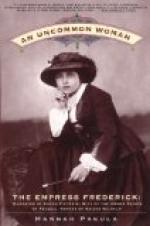(*) Such horribly cruel punishments of the serfs were at that time no uncommon occurrence in Russia. Unhappy serfs were daily scourged to death at the command of their masters. Moreover, princes and generals, and even respectable ladies, were scourged with the knout at the command of the emperor. Yet these punishments in Russia had nothing dishonoring in them. The Empress Catharine II. had three of her court ladies stripped and scourged in the presence of the whole court, for having drawn some offensive caricatures of the great empress. One of these scourged ladies, afterward married to a Russian magnate, was sent by Catharine as a sort of ambassadress to Sweden, for the purpose of inducing the King of Sweden to favor some of her political plans.—“Memoires Secrets sur la Russie, par Masson,” vol. iii., p. 392.
From that time forward, however, Munnich’s life was a continuous chain of vexations and mortifications. As his inordinate ambition was known, he was constantly suspected, and was reprehended with inexorable severity for every fault.
It is true the regent raised him to the post of first minister; but Ostermann, who recovered his health after the successful termination of the revolutionary enterprise, by various intrigues attained to the position of minister of foreign affairs; while to Golopkin was given the department of the interior, so that only the war department remained to the first minister, Munnich. He had originated and accomplished two revolutions that he might become generalissimo, and had obtained nothing but mortifications and humiliations that embittered every moment of his life!
THE REGENT ANNA LEOPOLDOWNA
Anna had succeeded, she was regent; she had shaken off the burden of the Bironic tutelage, and her word was all-powerful throughout the immeasurable provinces of the Russian empire. Was she now happy, this proud and powerful Anna Leopoldowna? No one had ever yet been happy and free from care upon this Russian throne, and how, then, could Anna Leopoldowna be so? She had read the books of Russian political history, and that history was written with blood! Anna was a woman, and she trembled when thinking of the poison, the dagger, the throttling hands, and flaying sword, which had constantly beset the throne of Russian, and in a manner had been the means in the hands of Providence of clearing it from one tyrant, only, indeed, to make room for another. Anna, as we have said, trembled before this means of Providence; and when her eyes fell upon Munnich—upon his dark, angry brow and his secretly threatening glance—she then with inward terror asked herself: “May not Providence have chosen him for my murderer? Will he not overthrow me, as he overthrew his former master and friend Duke Biron?”
Anna now feared him whom she had chiefly to thank for her greatness. At the time when he had made her regent he had satisfactorily shown that his arm was sufficiently powerful to displace one regent and hurl him to the dust! What he had once done, might not he now be able to accomplish again?




